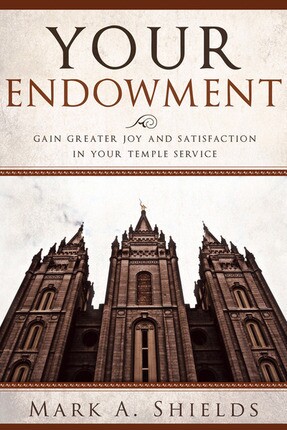Words matter. Precision in communication matters. For example, the words used in sacramental prayers over the bread and water are prescribed (see D&C 20:77, 79). The bishop as an overseer (the literal meaning of the word for “bishop” in Greek is episkopos, meaning “overseer”) ensures that the priests have said the prayer properly, correctly, and with precision. Otherwise, the prayer needs to be said again, correctly.
Though there are heaven-prescribed ways of talking about receiving an endowment, too often in our culture we use or hear the incorrect and imprecise phrase, “I took out my endowment” or “she took out her endowment” instead of “I received my endowment” or “she received her endowment.”
Why Does This Matter?
Consider this analogy. We know from the Articles of Faith “that the first principles and ordinances of the Gospel are: first, Faith in the Lord Jesus Christ; second, Repentance; third, Baptism by immersion for the remission of sins; fourth, Laying on of hands for the gift of the Holy Ghost.” We all know that without baptism and the Gift of the Holy Ghost it is impossible to return to God. So important are these rituals and ordinances that the Church requires witnesses at baptisms and prescribes the initial words to be used with the laying on of hands for the gift of the Holy Ghost, as summarized in Elder Bednar’s October 2010 General Conference address entitled “Receive the Holy Ghost”:
“The ordinance of confirming a new member of the Church and bestowing the gift of the Holy Ghost is both simple and profound. Worthy Melchizedek Priesthood holders place their hands upon the head of an individual and call him or her by name. Then, by the authority of the holy priesthood and in the name of the Savior, the individual is confirmed a member of The Church of Jesus Christ of Latter-day Saints, and this important phrase is uttered: ‘Receive the Holy Ghost.’”
What a beautiful phrase: “Receive the Holy Ghost.” This statement is in the command form, underscoring that our access to the Holy Ghost is a proactive effort, rather than a passive experience. We are to actively to seek after the Holy Ghost. When we receive the Holy Ghost in our lives, it is a gift, not something that we earned or something that we demanded to have in our lives, but rather a gift offered to all who seek in faith.
The True Meaning of Our Endowment
How does this relate to the endowment? The endowment is also a gift. It is not something that we demand or something that we earn. It is a gift freely given to all who proactively seek it in faith, repentance, and humility.
Significantly, the word endowment is derived from the Greek word enduo, which means “to clothe.” If we think about the temple experience, we are physically covered and clothed with white temple garments which symbolically represent how the Atonement of Jesus Christ covers and clothes us with purity so that we can enter into God’s presence once again.
Because the endowment is a gift, it is only appropriate to say “I received my endowment” or “she received her endowment” or similar statements.
Thus it is erroneous to say “I took out my endowment” or “she took out her endowment.” We would never say after baptism, “I took out the Holy Ghost” or “she took out the Holy Ghost.” Similarly, we would never say after opening gifts at Christmas, “I took out my gifts at Christmas.” Instead, we properly say, “I received gifts at Christmas.”
We can elevate our speech and speak properly of the gift of the endowment, which represents receiving the Atonement of Jesus Christ. Most appropriately then, we “receive” the endowment—with love and gratitude for the Giver of this—and all—good gifts.
Lead image fromlds.org

For additional resources, check out Your Endowment by Mark A. Shields, Preparing for Your Endowment by Cory Jensen, Symbols and Shadows: Unlocking a Deeper Understanding of the Atonementby Jay A. Parry and Donal W. Parry, Understanding Temple Symbols by Jack M. Lyon, The Holy Temple by Boyd K. Packer, and Temple Reflections by Alonzo L. Gaskill.





